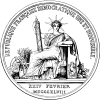Édouard Drouyn de Lhuys


Edouard Drouyn de Lhuys (pronounced [edwaːʁ dʁuɛ̃ də‿lɥis]; 19 November 1805 – 1 March 1881) was a French statesman and diplomat, born at Melun in the department of Seine et Marne. He was educated at the Lycée Louis-le-Grand. The scion of a wealthy and noble house, he excelled in rhetoric. He quickly became interested in politics and diplomacy.
He was ambassador at The Hague and Madrid, and distinguished himself by his opposition to Guizot. Drouyn de Lhuys served as Minister of Foreign Affairs from 1848 to 1849 in the first government of Odilon Barrot. In Barrot's second government, he was replaced by Alexis de Tocqueville, and was appointed ambassador to London. He returned briefly as foreign minister for a few days in January 1851, and then returned permanently in the summer of 1852, becoming the first foreign minister of the Second Empire. He resigned his post in 1855, during the Crimean War, when the peace preliminaries he had agreed to in consultation with the British and Austrians at Vienna were rejected by Napoleon III.
Édouard Drouyn de Lhuys returned to power 7 years later, in 1862, when foreign minister Édouard Thouvenel resigned over differences with Napoleon on Italian affairs. Drouyn was thus foreign minister in the lead-up to the Austro-Prussian War. In the aftermath of that war, which was seen as disastrous to French interests in Europe, Drouyn resigned. He withdrew into private life after the collapse at Sedan in 1870.
Honours
- 1854: Knight Grand Cross in the Order of Leopold.[1]
References
- ^ Handelsblad (Het) 25-12-1854
- Obituary. Edouard Drouyn-de-Lhuys. New York Times, 3 March 1881. Accessed 7 October 2008
- The Illustrated London News, May 19, 1855.
See also
This article incorporates text from a publication now in the public domain: Wood, James, ed. (1907). The Nuttall Encyclopædia. London and New York: Frederick Warne. {{cite encyclopedia}}: Missing or empty |title= (help)




